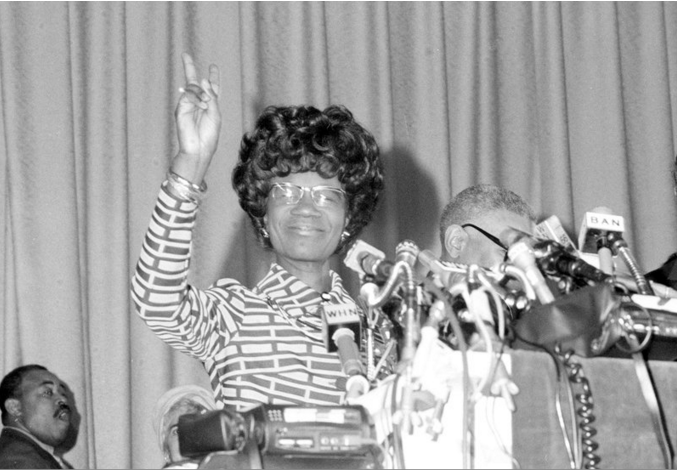
On February 6th, Chisholm Project Director Zinga Fraser was featured in a “She Got Next”, an episode of NPR’s Throughline podcast dedicated to three pioneering Congresswomen who ran for president—Margaret Chase Smith, Shirley Chisholm and Pat Shroeder.
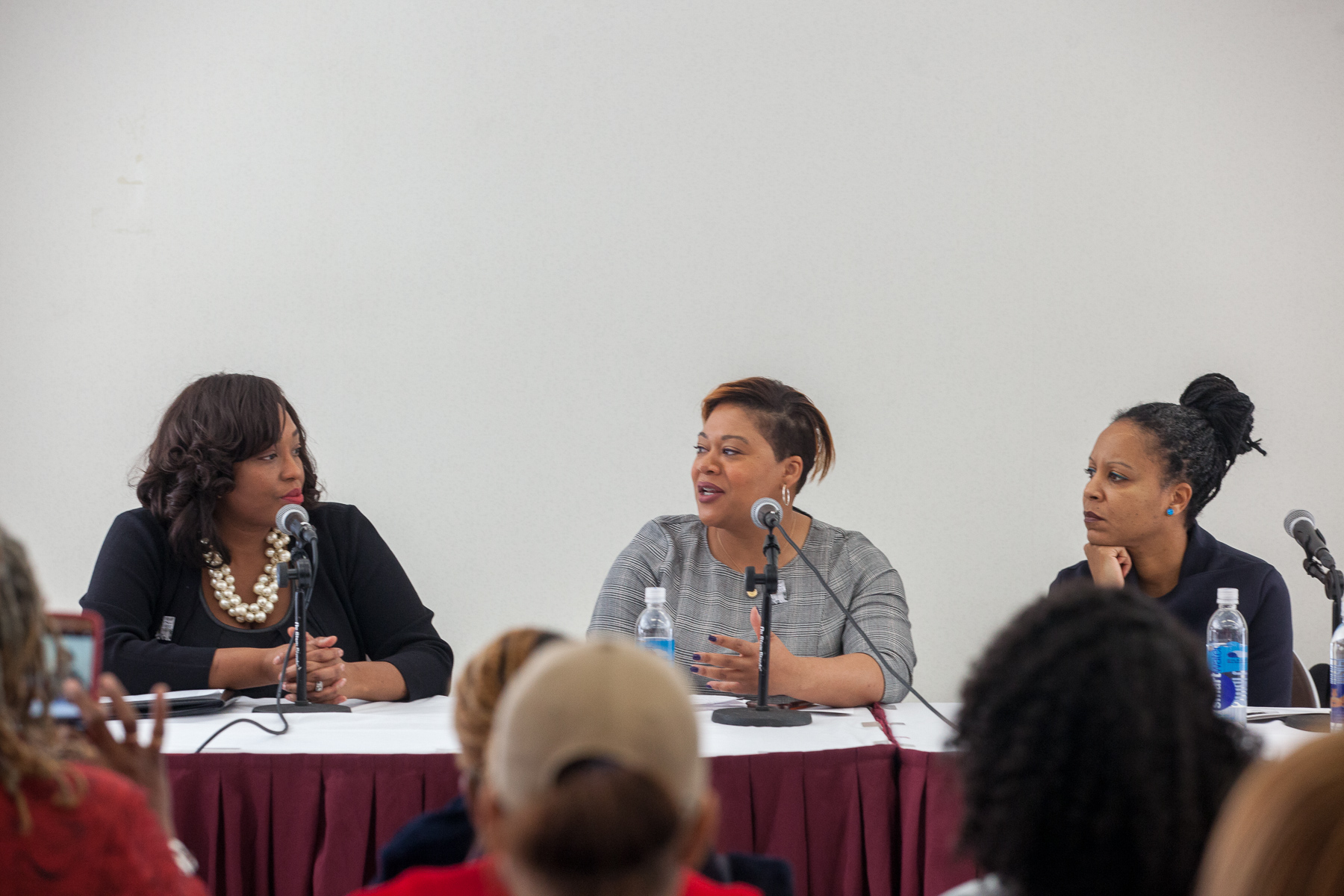 [Pictured above: Drs. Fraser (left) and Carter (center) at the Black Women’s Roundtable Discussion for Chisholm Day 2018 at Brooklyn College]
[Pictured above: Drs. Fraser (left) and Carter (center) at the Black Women’s Roundtable Discussion for Chisholm Day 2018 at Brooklyn College]
In the podcast, Dr. Fraser, an expert on Shirley Chisholm, African-American History and Black Congressional politics, detailed Shirley Chisholm’s life of political activism—from grassroots political organizer, State Assemblywoman, first Black Congresswoman and insurgent presidential candidate. Dr. Niambi Carter, professor at Howard University joined Fraser in telling the story of Chisholm’s political career.
“There were all these questions,” Professor Fraser pointed out when describing Chisholm’s decision to run for the presidency in 1972:
Why Shirley Chisholm? Why does she have the audacity to think that she has the right to run for the highest office in the land. And she simply responds,“Why not?”
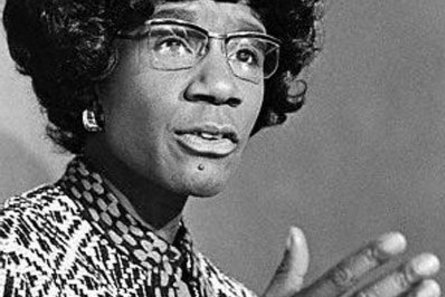
Shirley Chisholm declared her presidential candidacy in a tempestuous time of American history, against crosscurrents of multiple social and historical forces. Nixon, who was seeking re-election, rose to power by exploiting racial resentment among white voters after the fragile, hard-fought gains of the Civil Rights Struggle. Youth between 18 and 21 years were also projected to influence the election because of the passage of the 26th Amendment and because of a strong wave of anger about the War in Vietnam. Both the feminist movement and African-Americans were trying to flex their growing power to influence the presidential election. The Gay Liberation movement was also gaining traction after the Stonewall Riots in 1969. Poor and working class voters were also due to rising economic inequality and the dismantling of New Deal and War-on-Poverty era programs. Shirley Chisholm did not just run to become a symbol; she ran because she believed—as a Black youth educator, daughter of poor immigrants, she was the best candidate to help marginalized groups gain political power. 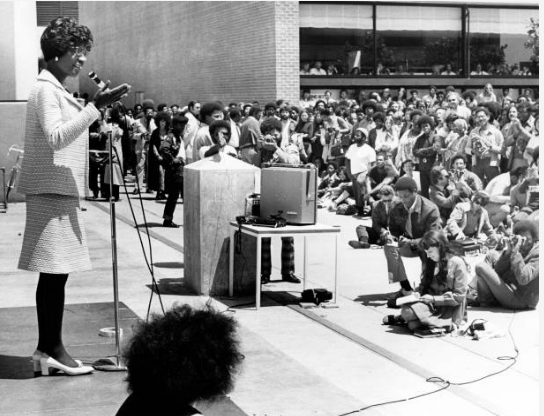 Although overlooked by the media and political establishments in her day, Shirley Chisholm’s presidential campaign helped to re-define the Democratic Party and the landscape of presidential elections. Hers was not merely a symbolic candidacy, but one in which she sought to strengthen the hand of women, youth and minorities on the national political stage. She believed she could do that best by fighting to involve more people into the electoral process, and by gaining power through the primaries to influence the Democratic Party at the negotiating tables of the Democratic National Convention. Chisholm did not want African-Americans, or other minorities or women, youth or the working class to be taken for granted in the selection of the party’s nominee and platform. And so, she fought against better-known, better-exposed and better-financed opponents. She fought in a successful lawsuit against the major networks to be included in a primary debate in Los Angeles. She fought with a skeletal staff and no corporate backing. She fought, despite all odds, all the way to the Convention.
Although overlooked by the media and political establishments in her day, Shirley Chisholm’s presidential campaign helped to re-define the Democratic Party and the landscape of presidential elections. Hers was not merely a symbolic candidacy, but one in which she sought to strengthen the hand of women, youth and minorities on the national political stage. She believed she could do that best by fighting to involve more people into the electoral process, and by gaining power through the primaries to influence the Democratic Party at the negotiating tables of the Democratic National Convention. Chisholm did not want African-Americans, or other minorities or women, youth or the working class to be taken for granted in the selection of the party’s nominee and platform. And so, she fought against better-known, better-exposed and better-financed opponents. She fought in a successful lawsuit against the major networks to be included in a primary debate in Los Angeles. She fought with a skeletal staff and no corporate backing. She fought, despite all odds, all the way to the Convention.
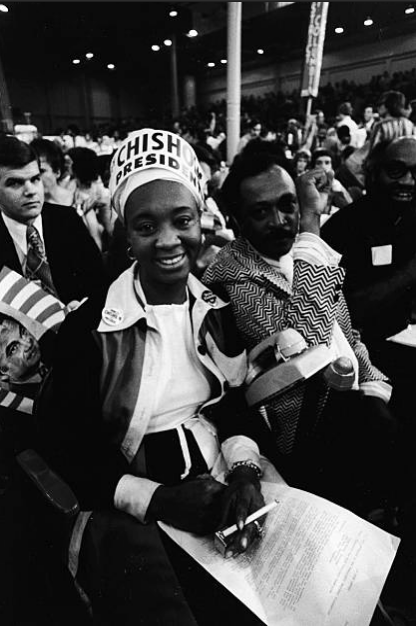
Chisholm’s accomplishment was not just exceptional for 1972. It is a feat that is still unmatched, nearly fifty years later. As Professor Fraser pointed out in the podcast:
“Even in 2020, there will be no African-American or African-American woman who will make it to the convention floor. But Shirley did in 1972.”
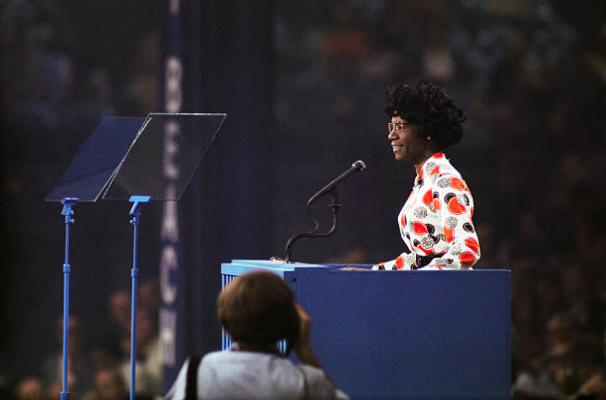 [Chisholm speaking at the Convention]
[Chisholm speaking at the Convention]
Listen to the full podcast HERE ; the segment on Shirley Chisholm begins 23 minutes, 7 seconds into the program.